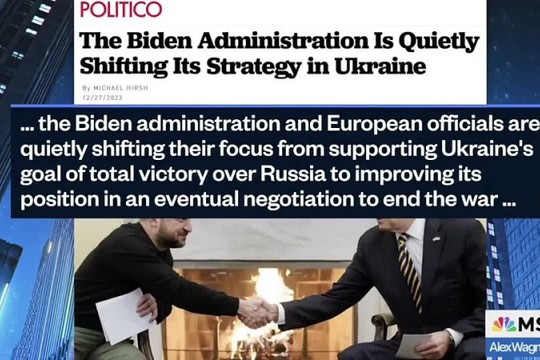For two years, Biden and Zelenskyy have been focused on driving Russia from Ukraine. Now Washington is discussing a move to a more defensive posture, writes Michael Hirsh, a former foreign editor and chief diplomatic correspondent for Newsweek, and the former national editor for POLITICO Magazine.
With U.S. and European aid to Ukraine now in serious jeopardy, the Biden administration and European officials are quietly shifting their focus from supporting Ukraine’s goal of total victory over Russia to improving its position in an eventual negotiation to end the war, according to a Biden administration official and a European diplomat based in Washington. Such a negotiation would likely mean giving up parts of Ukraine to Russia.
The White House and Pentagon publicly insist there is no official change in administration policy — that they still support Ukraine’s aim of forcing Russia’s military completely out of the country. But along with the Ukrainians themselves, U.S. and European officials are now discussing the redeployment of Kyiv’s forces away from Ukrainian President Volodymyr Zelenskyy’s mostly failed counteroffensive into a stronger defensive position against Russian forces in the east, according to the administration official and the European diplomat, and confirmed by a senior administration official.
“That’s been our theory of the case throughout — the only way this war ends ultimately is through negotiation,” said the official, a White House spokesperson who was given anonymity because they are not authorized to speak on the record. The spokesperson emphasised, however, that no talks are planned yet.
For Biden, navigating the nearly two-year-old war in the middle of a tough election campaign — with former President Donald Trump and other Republican candidates openly mocking his efforts — will prove tricky at best.
“Those discussions [about peace talks] are starting, but [the administration] can’t back down publicly because of the political risk” to Biden, said a congressional official who is familiar with the administration’s thinking and who was granted anonymity to speak freely.
In an interview on Dec. 21, John Kirby, head of strategic communications at the National Security Council, said that with Washington “nearing the end of our ability” to provide military assistance to the Ukrainians because Republicans have blocked Biden’s request for roughly $60 billion more in aid, the Biden administration is “very much focused on helping them on offence and defence.”
“We are having literally daily conversations with the Ukrainians about the battlefield, about what their needs are and their intentions,” Kirby said. But he added: “I’m not going to telegraph to the Russians what the Ukrainian strategy is in the coming months.”
Over the past year — with U.S. military support flagging fast on Capitol Hill and Zelenskyy’s once-vaunted counteroffensive failing since it was launched in June — Biden has shifted from promising the U.S. would back Ukraine for “as long as it takes,” to saying the U.S. will provide support “as long as we can” and contending that Ukraine has won “an enormous victory already. Putin has failed.”
Some analysts believe that is code for: Get ready to declare a partial victory and find a way to at least a truce or ceasefire with Moscow, one that would leave Ukraine partially divided.
The European diplomat based in Washington said that the European Union is also raising the threat of expediting Ukraine’s membership in NATO to “put the Ukrainians in the best situation possible to negotiate” with Moscow.
Foreign policy wasn’t expected to play a major role in the 2024 campaign — especially as inflation surged in the first two years of Biden’s term and economists last year predicted a recession. The U.S. economy will still likely be the main issue, polls show, and a new memo says the central theme of Biden’s campaign will be “protecting American democracy.” But with inflation fast retreating — dropping from more than 9.1 percent a year ago to close to the Federal Reserve’s target of 2 percent now — and the economy closer to achieving a highly unusual “soft landing,” the calculus of what could affect voting in 2024 may be changing, says Bruce Jentleson, a scholar of the presidency at Duke University. Biden is still suffering low approval ratings that Gallup has called “the worst of any modern-day president heading into a tough reelection campaign” — and his handling of foreign affairs in general and Israel and Ukraine in particular have recently become factors in that assessment.
As a result, multiplying crises abroad could imperil the president in the voting booth, says Jentleson, a former adviser to Vice President Al Gore. “What often happens is you get a bank shot where voters look at how you do foreign policy. They don’t care about the issues per se but they want to see leadership.”
Still, Biden faces political peril if the war goes badly for the Ukrainians. Even if Republicans on the Hill are mainly responsible for holding up military aid, that won’t help Biden much politically if Putin starts to regain the battlefield advantage next year, after the nearly $100 billion Biden’s already put into stopping Russia.
In late September Sergei Shoigu, Russia’s defense minister, said the Russians had an “activity plan until 2025,” and the next month Putin declared that Ukraine would have a “week to live” if arms supplies from Western countries were to end, Michael Hirsh concludes.
read more in our Telegram-channel https://t.me/The_International_Affairs

 10:49 06.01.2024 •
10:49 06.01.2024 •























